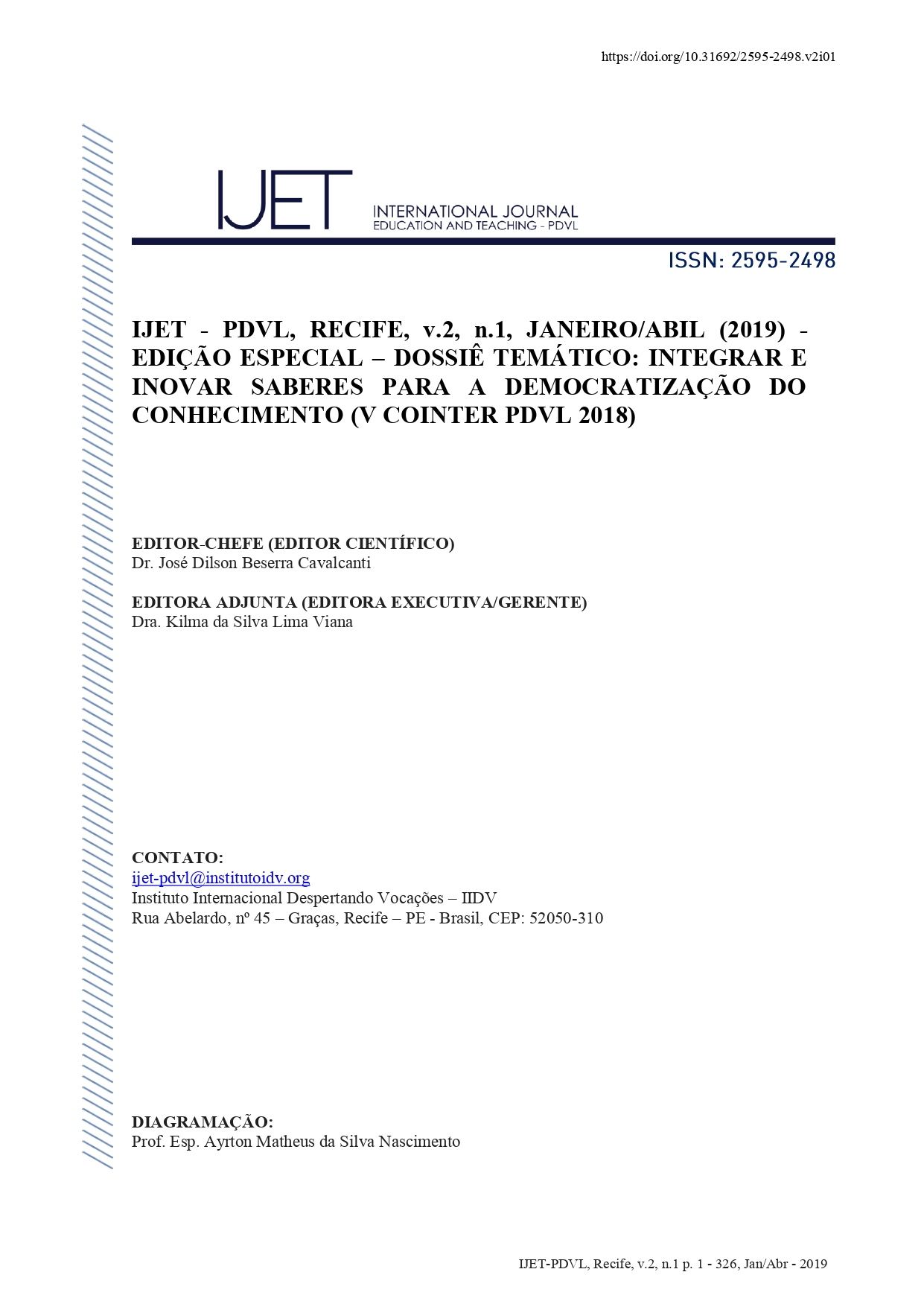SURFACE TENSION IN CHEMISTRY TEACHING: AN EXPERIMENTAL PRACTICE AND A DIDACTIC GAME BASED ON THE KELLY'S CYCLE OF EXPERIENCE
Keywords:
Chemistry Teaching, Experimentation, Didactic Game, CEKAbstract
Avoidance on teachers development undergraduation courses is a problem that has been studied for a long time, mainly in the area of chemistry, and the reports are always related to teaching practices since High School, which is most often marked by the Traditional approach, in which students should only memorize and reproduce content, without any connection with their daily life, allowing a distancing between the students and the discipline. Another point to consider is the realization of experimental practices that are very important in the field of chemistry, and which are often not done due to lack of space and materials in laboratories, further contributing to students' lack of interest in chemistry. In order to stimulate the chemistry teaching, this article aims to analyze the development of an experimental activity and a didactic game for the content of "Surface tension" based on the Kelly's Cycle of Experience - CEK. The work is deriving by extension activities carried out from the International Program Awakening Vocations for Licentiates (PDVL) and for its execution, we conducted an experiment on the surface tension content, using as a methodological basis the George Kelly's Cycle of Experience - CEK Kelly (1963), which is composed of five stages: Anticipation, Investment, Encounter, Confirmation or Disconfirmation and Constructive Revision. The research subjects were 30 students from the grade 10 at Dias Cardoso Secondary School, in the city of Vitória de Santo Antão-PE. From the study, we noticed that the students emphasized that the use of experiments and games in the teaching and learning process in chemistry classes make a total difference, reporting that "classes are more dynamic" and "we can understand the content with more facility". Thus, we conclude that the use of experiments and didactic games, when allied to the CEK, are effective for the construction of knowledge.
Downloads
References
CAMPANARIO, J. M.; MOYA, A. ¿Como enseñar ciencias? principales tendencia y propuestas. Enseñanza de las Ciencias, n. 17, v. 2, 2001. p. 179-192.
DELORS, J. Educação: um Tesouro a Descobrir. 1ª Ed. São Paulo: Cortez, 2001.
GALLIAZZI, M. C. et al. Objetivos das atividades experimentais no ensino médio: a pesquisa coletiva como formação de professores de ciências. Ciência e Educação. v.7.n. 2. 2001. p. 249-263.
GIL, A. C. Métodos e técnicas de pesquisa social. 5.ed. São Paulo: Atlas, 1999.
GIL-PEREZ, D. Contribuición de la Historia y de la filosofía de las Ciencias al desarollo de un modelo de enseñanza e aprendizaje como investigación. Enseñanza de las Ciencias. v. 11, n. 2, 1993. p. 197-212.
GIORDAN, M. O Papel da Experimentação no Ensino de Ciências. Química Nova na Escola, 1999.
HARTWIG, D. R.; DOMINGUES, S. F. Equilibração entre os pontos qualitativos e quantitativos no ensino de química. Química Nova, Campinas, v. 8, n. 2, p.116-119, 1985.
KELLY, G. A. A theory of personality: the psychology of personal constructs. New York: W. W. Norton, 1963.
KISHIMOTO, Tizuko Morchida. O jogo e a educação infantil. 1ª ed. São Paulo: Pioneira, 1994.
LIMA, J. F. L.; et al. A contextualização no ensino de cinética química, Química Nova na Escola. 11, 26-29, 2000.
NUNES, A. S. ; Adorni, D.S . O ensino de química nas escolas da rede pública de ensino fundamental e médio do município de Itapetinga-BA: O olhar dos alunos.. In: Encontro Dialógico Transdisciplinar - Enditrans, 2010, Vitória da Conquista, BA. - Educação e conhecimento científico, 2010.
MARQUES, M. O. A Formação do Profissional da Educação; Editora Unijuí, Rio de Janeiro, 1992.
MORTIMER, E. F.; MACHADO, A. H.; ROMANELLI, L. I. A proposta curricular de Química do estado de Minas Gerais: fundamentos e pressupostos. Química Nova, v. 23, n. 2, 2000.
POZO, J. I. Teorias Cognitivas da Aprendizagem. 3ª ed. Tradução de J. A. Llorens. Porto Alegre: Artmed, 1998. 284p.
SANTOS, W. L. P.; SCHNETZLER, R. P. Educação em Química: compromisso com a cidadania. 2ª Ed., Ijuí, Editora Unijuí, 2000.
WELLINGTON, J. (ed.) Practical Work in School Science. London: Routledge. 1998.
ZANON, D.A.V.; GUERREIRO, M.A.S.; OLIVEIRA, R.S. Jogo didático Ludo Químico para o ensino dos compostos orgânicos: projeto, produção, aplicação e avaliação. Ciência e Cognição. v. 13, 2008. p. 72-81.

Downloads
Published
Conference Proceedings Volume
Section
License
Copyright (c) 2019 PALLOMA JOYCE DE AGUIAR SILVA , RAYANNE DA SILVA LIMA, FLÁVIO JOSÉ DE ABREU MOURA , RENATA JOAQUINA DE OLIVEIRA BARBOZA (Autor)

This work is licensed under a Creative Commons Attribution 4.0 International License.






